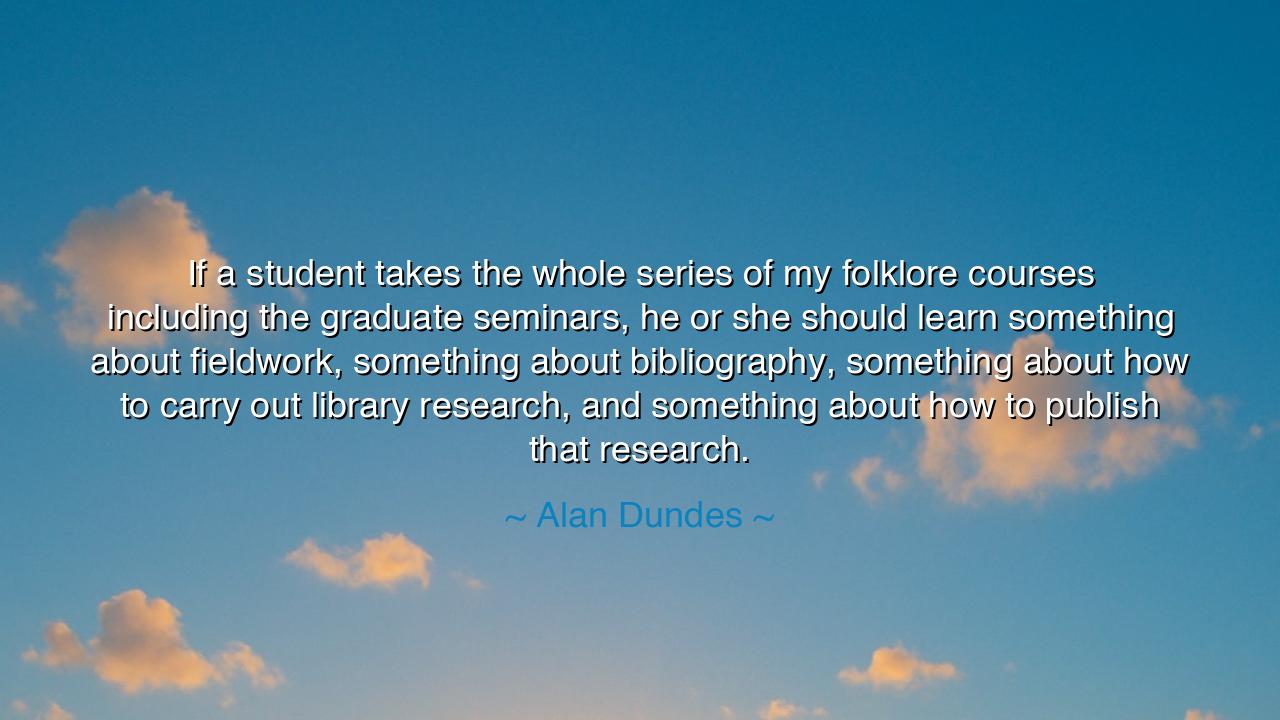
If a student takes the whole series of my folklore courses
If a student takes the whole series of my folklore courses including the graduate seminars, he or she should learn something about fieldwork, something about bibliography, something about how to carry out library research, and something about how to publish that research.






The words “If a student takes the whole series of my folklore courses including the graduate seminars, he or she should learn something about fieldwork, something about bibliography, something about how to carry out library research, and something about how to publish that research” spoken by Alan Dundes are not merely instructions to students; they are a meditation on the nature of true learning, the responsibility of scholarship, and the cultivation of wisdom through practice. Dundes, a towering figure in the study of folklore, speaks with the calm authority of one who has seen knowledge not as a collection of facts, but as a living craft. To study folklore under his guidance was not to memorize stories or catalog traditions, but to engage in the full discipline of discovery, documentation, and dissemination.
In the style of the ancients, one might compare Dundes to the philosophers of old who trained disciples not merely to know, but to act. Plato did not instruct only in the forms; he guided his students through dialectic, questioning, and observation, teaching them how to seek truth actively. Likewise, Dundes’ vision of education extends beyond lectures: a student must learn fieldwork, to witness and record the living traditions of people; learn bibliography, to understand the intellectual lineage of ideas; learn library research, to place new knowledge in the context of the old; and learn to publish, to contribute one’s discoveries to the eternal dialogue of scholarship. Each step is a rite of passage, a training of the mind as well as the hands.
The origin of Dundes’ approach lies in his understanding of folklore not as static artifacts, but as living expressions of culture. His courses were designed to immerse students in the practical and ethical realities of scholarship. One does not study folktales simply by reading them; one must seek them in the fields, in the homes, in the voices of those who carry them across generations. In this, Dundes echoed the anthropologists and ethnographers who preceded him, like Franz Boas, who emphasized participant observation and rigorous methodology as the foundation of understanding human culture. Dundes’ pedagogy is both traditional and visionary, marrying method with creativity.
Consider the story of Bronislaw Malinowski, who revolutionized anthropology by living among the Trobriand Islanders and meticulously documenting their customs. He did not merely read about their practices; he engaged in fieldwork, observation, and analysis, producing work that became foundational. Dundes’ insistence on students mastering fieldwork mirrors this tradition: knowledge becomes meaningful only when it is actively sought, ethically collected, and thoughtfully interpreted. Likewise, bibliography and library research anchor new discoveries in a lineage of human understanding, reminding students that scholarship is both a dialogue and a responsibility.
Publishing, the final step in Dundes’ outline, completes the journey. To conduct research and keep it hidden is to deny the world the gift of knowledge. As the ancients knew, wisdom gains its power when shared. Aristotle’s treatises endured because he wrote, because he transmitted his discoveries for others to study and debate. Dundes’ insistence on teaching students to publish ensures that the flame of insight passes from mind to mind, from generation to generation. It is an acknowledgment that learning is not solitary, but communal — that knowledge achieves immortality through dissemination.
Dear listener, the lesson here is eternal: education is not complete until knowledge is applied, shared, and preserved. To study deeply without practice is like planting seeds in barren soil. Dundes’ approach reminds us that mastery requires both discipline and engagement, a balance between the theoretical and the practical. To learn fieldwork, research, and publication is to honor the entire cycle of discovery — from observation to interpretation, and finally to contribution.
Take this as a call to action: embrace learning as a holistic process, one that shapes your mind, your hands, and your voice. Do not be content with passive absorption; seek out experience, question sources, document rigorously, and share widely. Like Dundes’ students, you are not merely accumulating facts — you are being trained in a craft that is both intellectual and ethical, one that will prepare you to contribute meaningfully to the ongoing story of human understanding.
In the end, Dundes’ wisdom endures: knowledge without practice, reflection, and communication is incomplete. Let every step of your learning be deliberate and engaged, from the field to the page, from observation to publication. The true scholar, like the ancients and like Dundes’ students, does not stop at knowing; the scholar seeks, records, analyzes, and then offers wisdom to the world. It is in this cycle that learning achieves its fullest, most heroic form.






AAdministratorAdministrator
Welcome, honored guests. Please leave a comment, we will respond soon